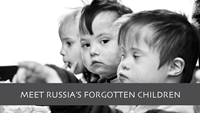Child Protection Policy
We at ROOF (Russian Orphan Opportunity Fund) believe that it is always unacceptable for a child or young person to experience abuse or neglect of any kind and recognise our responsibility to safeguard the welfare of all children and young people with whom we are in contact. These guidelines are intended to ensure the safety and protection of all children involved in ROOF projects or activities.
We recognise that:
- the welfare of the child/young person is paramount;
- all children, regardless of age, disability, sex, racial heritage, religious or other beliefs, sexual orientation or identity, or any other personal qualities, have the right to equal protection from all types of harm, abuse or neglect;
- working in partnership with children, young people, their parents, guardians, carers and other appropriate agencies is essential in promoting young people’s welfare.
The purpose of this policy is:
- to provide protection for the children and young people who receive services or support from ROOF, including the children of adult staff and volunteers;
- to provide staff and volunteers with guidance on procedures they should adopt in the event that they suspect a child or young person may be experiencing, or be at risk of, harm;
This policy applies to all staff, including senior managers and the board of trustees, paid staff, volunteers and sessional workers, agency staff, students or anyone working for or on behalf of ROOF.
Safeguards
We will seek to safeguard children and young people by:
- valuing them, listening to and respecting them;
- adopting child protection guidelines through procedures and a code of conduct for staff and volunteers;
- recruiting staff and volunteers safely, ensuring any appropriate checks are made;
- sharing information about child protection and good practice with children, parents or guardians, staff and volunteers;
- sharing information about concerns with agencies who need to know, and involving children and parents or guardians as is appropriate;
- providing effective management for staff and volunteers through supervision, support and training.
Child abuse, particularly sexual abuse, can arouse strong emotions in those facing such a situation. It is important to understand these feelings and not allow them to interfere with your judgement about the appropriate action to take.
Abuse can occur within many situations including institutions, schools, camps, clubs or the home. A camp volunteer, teacher, coach, instructor, official or other responsible adult will have regular contact with young people and be an important link in identifying cases where they need protection.
ROOF works with vulnerable children, some of whom may have been the victims of abuse in the past. When a child enters a ROOF activity having been subjected to child abuse elsewhere, the community nature and supportive atmosphere of ROOF's projects can play a crucial role in improving the child’s understanding of himself or herself and how to appropriately relate to others. ROOF staff and volunteers must be aware of the possibility of past abuse in the lives of any child, and be sensitive to the child's individual needs. ROOF staff and volunteers must also be aware of the possibility of ongoing abuse, and be ready to report any suspicious indicators to supervising staff or senior management of ROOF.
Good practice means:
- Always work in an open environment (e.g. avoiding private or unobserved one-to-one situations and encouraging open communication with no secrets).
- Treat all young people/disabled adults equally, and with respect and dignity.
- Always put the welfare of each young person first, before achieving activity goals.
- Maintain a safe and appropriate distance in activities (e.g. it is not appropriate for staff or volunteers to have an intimate relationship with a child or to share a room with them).
- Build balanced relationships based on mutual trust which empowers children to share in the decision-making process.
- Make activities fun and enjoyable and promote fair play.
- Ensure that if any form of manual/physical support is required, it should be provided openly and according to guidelines provided by relevant orphanage or ROOF staff. Young people should always be consulted and their agreement gained.
- Be an excellent role model at all times.
- Give enthusiastic and constructive feedback rather than negative criticism.
- Recognise the developmental needs and capacity of children and young people with or without disabilities.
Practices never to be sanctioned
The following should never be sanctioned. You should never:
- engage in rough or provocative games;
- allow or engage in any form of inappropriate touching;
- allow children to use inappropriate language unchallenged;
- make sexually suggestive comments to a child, even in fun;
- reduce a child to tears as a form of control;
- fail to act upon and record any allegations made by a child;
- do things of a personal nature for children (with or without disabilities) that they can do for themselves.
N.B. It may sometimes be necessary for staff or volunteers to do things of a personal nature for children, particularly if they are young or are disabled. These tasks should only be carried out with the full understanding and consent of ROOF or orphanage staff and the children involved. There is a need to be responsive to a person’s reactions. If a person is fully dependent on you, talk with him/her about what you are doing and give choices where possible. This is particularly so if you are involved in any dressing or undressing of outer clothing, or where there is physical contact, lifting or assisting a child to carry out particular activities. Ask advice of supervisory staff if you are at all doubtful.
Incidents that must be reported/recorded
You should report immediately to the supervisory staff or management of ROOF and record the incident if a child or young person:
- is hurt in the course of an activity;
- seems distressed in any manner;
- demonstrates inappropriate sexual responses;
- misunderstands or misinterprets something you have done.
Expectations and Sensitivity
We recognise that ROOF works with vulnerable children, especially children who suffer emotionally and psychologically as a result of abandonment and other relational issues from their past life experience. While it is very important to avoid any inappropriate physical contact, it is also important to note that a total avoidance of physical contact with such children may also be inappropriate and can be considered a form of neglect. All ROOF staff and volunteers are expected to recognise that culturally acceptable modes of physical interaction are varied, that the expectations of children, volunteers and staff may be different from our own, and to act sensitively and appropriately. If you are in any doubt, please ask the advice of experienced staff, volunteers or ROOF management.
Thank you for your help in keeping safe all the children and young people that we help and support!
We are committed to reviewing our policy and good practice annually. If you have any comments or suggestions, please share them with ROOF management.



